
Welkom in onze BIBLIOTHEEK
Overzicht van boeken over over uitzonderlijke hoogbegaafdheid:
Nederlandstalig
Hoogbegaafde kinderen versnellen niet
Renata Hamsikova

Misschien denk je “wat raar, hoogbegaafde kinderen versnellen juist wel”. Nou, eigenlijk niet. Je versnelt het kind niet, het leert alleen sneller ten opzichte van andere kinderen. De term versnellen heeft in Nederland nog steeds een negatieve lading. Dit komt doordat men onvoldoende kennis heeft over de effecten van versnellen, lees: over de effecten van een hoogbegaafd kind in zijn ontwikkeling volgen.
Daarom heb ik deze publicatie geschreven. Om leerkrachten inzichten te geven die gebaseerd zijn op wetenschappelijk onderzoek en niet op onderbuikgevoel en om hen te helpen bij het onderwijzen van hoogbegaafde leerlingen.
Slapende leeuwen
Els De Wit
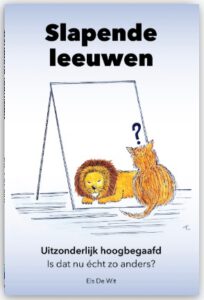
Uitzonderlijke hoogbegaafdheid, is dat nu écht zo anders? In België beginnen we net te wennen aan het gegeven hoofdbegaafdheid, laat staan dat we begrijpen wat we moeten aanvangen met uitzonderlijke hoogbegaafdheid.
Dit boek geeft een helder overzicht van de meest relevante theorieën uit Europa en Amerika. Daarnaast geeft de auteur je inzage in de praktijk, die ook leidde tot een theoretische indeling van wat uitzonderlijke hoogbegaafdheid inhoudt.
Tot slot delen ouders speciaal voor dit boek getuigenissen. Het totaal geeft ouders en begeleiders een waardevolle blik achter de schermen.
Leven met intensiteit
Susan Daniels en Michael M. Piechowski
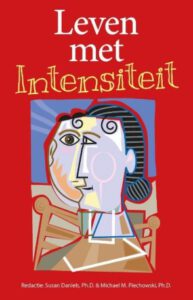
Wat als iemand “te veel’ is voor zijn of haar omgeving of zichzelf? Te slim, te beweeglijk, te emotioneel, zich te veel laat meeslepen door wat hij ziet of hoort, en/of een overactieve verbeelding heeft? Dat kan belastend zijn en tot frustraties of zelfs (psycho)neuroses leiden.
De hoofdstukken in dit boek laten aan de hand van de theorie van positieve desintegratie van Kazimierz Dabrowski zien dat dit uitingen van een bijzondere aanleg en begaafdheid kunnen zijn. De auteurs leren ouders, verzorgers, leraren en andere professionals om deze signalen te herkennen en hierop hun begeleiding af te stemmen om individuen met deze en andere talenten te helpen hun potentieel te ontplooien.
Dabrowski’s concepten van de hyperprikkelbaarheden en positieve desintegratie zijn behulpzaam bij het begrijpen van de gedragingen van sommige begaafde kinderen en volwassenen die anders onverklaarbaar zouden schijnen.
Uitzonderlijk talent – gids voor hoogbegaafden, uitvinders en andere vreemde vogels
Frans Corten
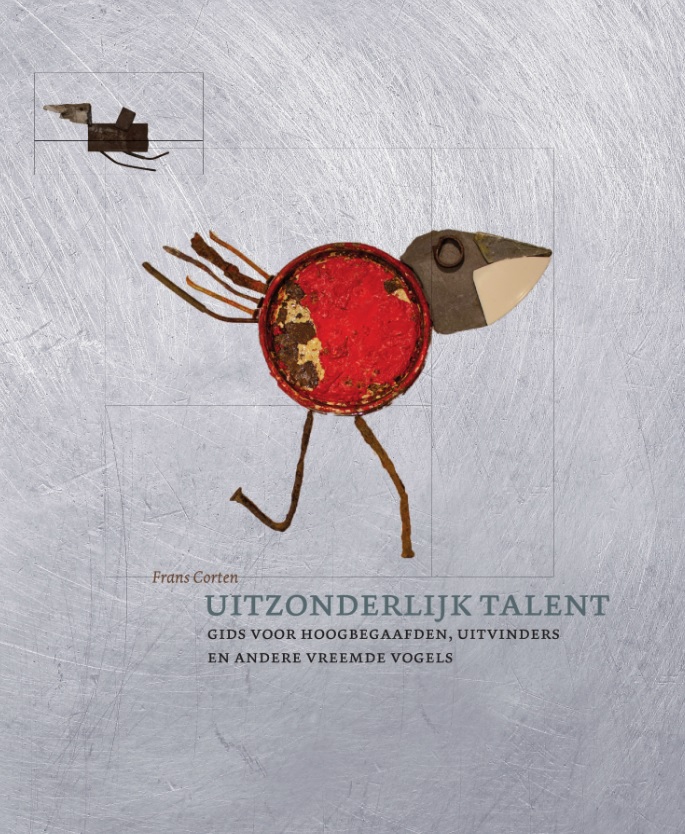
Veel hoogbegaafden en andere vreemde vogels blijken moeite te hebben om hun weg in het leven en hun werk te vinden. Ondanks hun talenten raken ze in conflict met leidinggevenden, voelen ze zich niet begrepen of kunnen ze maar niet ontdekken wat ze écht willen.
Frans Corten, zelf zo’n vreemde vogel, begeleidt hoogbegaafden en andere uitzonderlijke talenten in hun loopbaan. Hij is een van de pioniers op het gebied van hoogbegaafde volwassenen. In dit boek heeft hij alle werkzame inzichten en eigen uitvindingen bijeengebracht die behulpzaam kunnen zijn om beter je weg te vinden in leven en werk. Hij adviseert, niet belerend of betweterig maar geheel vrijblijvend en met respect voor de eigenzinnigheid van jou als vreemde vogel.
Vijf vreemde vogels die op hun pootjes terecht zijn gekomen vertellen achterin dit boek openhartig over de valkuilen en uitdagingen in hun loopbaan.
Uitzonderlijk talent biedt je een handleiding om je uitzonderlijke zelf te herkennen én serieus te nemen. En dat is het begin van je nieuwe toekomst.
Engelstalig
Exceptionally Gifted Children
Miraca U.M. Gross
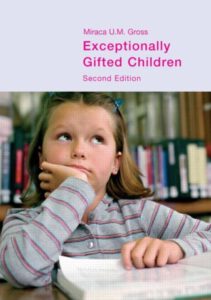
No previous study has traced so closely and so sensitively the intellectual, social and emotional development of highly gifted young people. This 20 year study reveals the ongoing negative academic and social effects of prolonged underachievement and social isolation imposed on gifted children by inappropriate curriculum and class placement and shows clearly the long lasting benefits of thoughtfully planned individual educational programs. The young adults of this study speak out and show how what happened in school has influenced and still influences many aspects of their lives. Miraca Gross provides a clear, practical blueprint for teachers and parents who recognise the special learning needs of gifted children and seek to respond effectively.
5 levels of gifted
Deborah Ruf
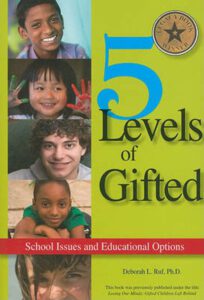
Giftedness exists on a continuum–there is a broad range of traits and behaviors that children can exhibit based on where they fall in that continuum. 5 Levels of Gifted is an award-winning book describing these differences within the gifted population. Author Deborah Ruf looks at 78 gifted children and groups them into five levels of giftedness based on developmental milestones, as well as test data. This information gives parents and educators a reference guide to compare with their own gifted children or students. The author then offers different educational approaches and practical advice, including how to find the best type of school for children at each level.
5 levels of gifted Children Grown Up
Deborah Ruf
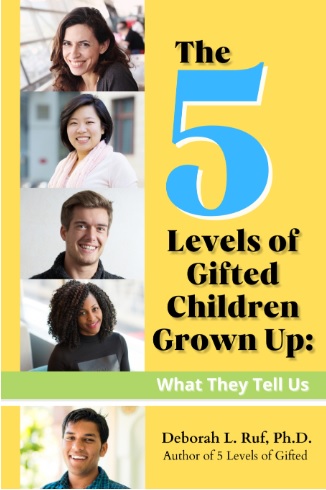
The 5 Levels of Gifted Children Grown Up is a detailed follow-up to Dr. Deborah Ruf’s previous book, 5 Levels of Gifted: School Issues and Educational Options. In this book, Dr. Ruf explores how background experiences and opportunities shape the lives of a specific group of gifted children – the ones from her previous book – as they reach adulthood.
Keys to Successfully Parenting the Gifted Child
Deborah Ruf

Keys to Successfully Parenting the Gifted Child shares factors to consider when finding the best overall fit for your bright or gifted child. The book describes what to look for when choosing the best educational options and schools for your child, and also shares ideas on how to effectively and proactively interact with educators and others in your child’s life for a healthy social, emotional, and academic balance.
Off the Charts: Asynchrony and the Gifted Child
Stephanie S. Tolan
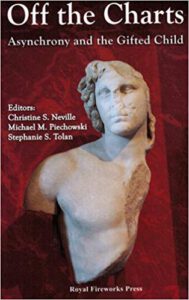
Off the Charts is an exploration of the effects of asynchronous development on gifted children and adults. It contains sections on Asynchrony and the Individual, Asynchrony and the Family, Asynchrony and Learning and chapters describe the nature of asynchrony, methods of dealing with the challenges of asynchrony, and recommendations for adapting education in a variety of settings. A Bibliography on Asynchronous Development provides extensive further reading.
The contributors’ contention is that Gifted Education should be from a child-centered perspective, rather than from a ‘product perspective’ in which the emphasis is on achievement, competition and outer recognition. The child-centered approach concentrates on self-development and personal growth and fosters interrelatedness and wholeness.
It is an important resource for parents, teachers, counselors, and others concerned with the optimal development of gifted to highly-gifted individuals.
Greatest Potential, Greatest Need: Soaring Beyond Expectations
Institute for the Development of Gifted Education
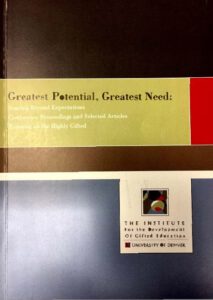
Highly gifted children are as different from gifted children as gifted children are from typical learners. And, as a reflection of their difference from the norm, they are highly unique individuals as well. The concept underlying many of these articles is based on Annemarie Roeper’s (1982) definition of giftedness: “Giftedness is a greater awareness, a greater sensitivity, and a greater ability to understand and transform perceptions into intellectual and emotional experiences”, and expanded upon by Linda Silverman: “The highly gifted have a different worldview”. Recognition of these differences and subsequent needs is not only essential to serve this population, but also to 5 Greatest Potential, Greatest Need: Soaring Beyond Expectations create environments that allow them to thrive. Those of us working with these children have no greater opportunity to impact the future than to care for and cherish these unique individuals.
Blessing or Curse? Life with a Highly Gifted Child
Renate Eichenberger
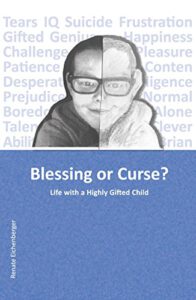
When Bastian was born in July 2000, his parents were looking forward to an exciting future, but right from the start Bastian brought surprise after surprise. He had started reading at the age of two, and was in the fifth year of school by age seven. He could speak eight languages by the time he was ten, and had passed almost enough A Levels to start university by thirteen.
Genius Denied
Jan Davidson, Bob Davidson and Laura Vanderkam
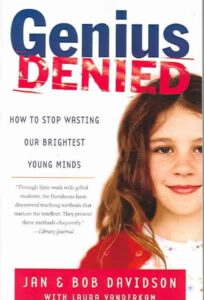
A call for more challenging school curricula for the millions of above-average or genius-level students in the U.S. today cites the consequences of failing to provide gifted children with educational programs better suited to their intellects, sharing case stories about children and parents who adapted or worked around public school systems.
High IQ Kids: Collected Insights, Information, and Personal Stories from the Experts
Kiesa Kay, Deborah Robson and Judy Fort Brenneman
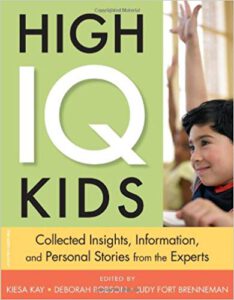
Profoundly gifted kids often get the least help in school. It’s assumed they’re smart enough to succeed on their own, plus teachers (and parents) feel out of their depth with these unique kids. A blend of personal stories and practical strategies, scholarly articles and entertaining essays from a community of voices—parents, educators, authors, researchers, and other experts—this book addresses the joys and challenges of raising and teaching, living with and understanding exceptionally gifted kids of all ages.
Challenging Highly Gifted Learners
Barbara Gilman
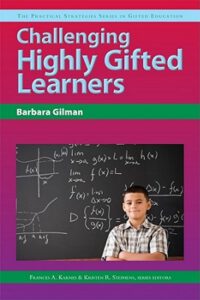
Challenging Highly Gifted Learners focuses on many of the issues involved in assessing and challenging highly gifted learners. A thorough discussion of the ceiling problems encountered on common assessments is included, as well as strategies for teachers and parents in planning appropriate education.
Developing Math Talent: A Guide for Educating Gifted and Advanced Learners
Susan Assouline Ph.D. and Ann Lupkowski-Shoplik Ph.D.
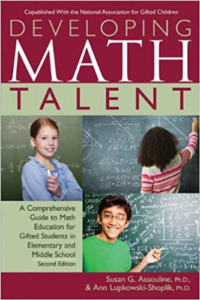
Build student success in math with the only comprehensive parent and teacher guide for developing math talent among advanced learners. The authors, nationally recognized math education experts, offer a focused look at educating gifted and talented students for success in math. More than just a guidebook for educators and parents, this book offers a comprehensive approach to mathematics education for gifted students of elementary or middle school age.
The authors provide concrete suggestions for identifying mathematically talented students, tools for instructional planning, and specific programming approaches.
Handbook on gifted Education
Nicholas Colangelo and Gary A. Davis
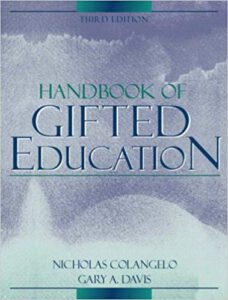
Written by well-known scholars in the field, Handbook of Gifted Education is the most complete book in the field of gifted education and contains an excellent balance of research and practical applications. This book includes topics such as high-risk gifted learners, the development of social skills in gifted learners, the science and politics of intelligence, creativity; thinking skills, exceptional special abilities, theory and conceptions of creativity, transforming gifts into talents, gifted education in rural schools, and technology in gidted education. Teachers of special education.
Via Amazon
Tekst te verkrijgen via Reasearchgate
Children Above 180 IQ Stanford-Binet Origin and Development
Leta Stetter Hollingworth
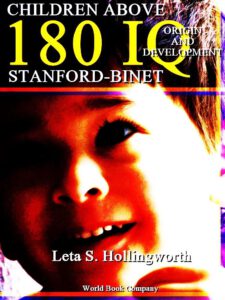
It is the first in-depth study and reference into the life of children with IQ’s higher than 180.
Hollingworth’s final study on gifted children was a longitudinal study of twelve children with IQs higher than 180. The twenty three years were spent finding the children and attempting an in-depth study. The results of the study suggested that many exceptionally gifted children suffer adjustment problems due to two factors: inept treatment by adults and lack of intellectual challenge. Adults would often ignore such children because they were thought to be self-sufficient. Myths that exceptional children were clumsy, fragile and eccentric were dismissed by the findings as well.
A Nation Deceived: How Schools Hold Back America’s Brightest Students
Nicholas Colangelo, Susan G. Assouline and Miraca U.M. Gross
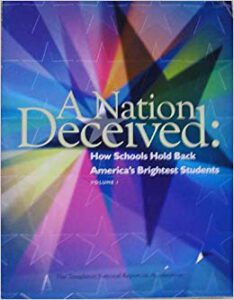
A Nation Deceived: How Schools Hold Back America’s Brightest Students is The Templeton National Report on Acceleration, a report which was published in 2004. It highlights disparities between the research on acceleration and the educational beliefs and practices that often run contrary to the research.
Tekst via Acceleration Institute
A Nation Empowered: Evidence Trumps the Excuses Holding Back America’s Brightest Students
Susan G. Assouline, Nicholas Colangelo, Joyce VanTassel-Baska and Ann Lupkowski-Shoplik

A Nation Deceived informed us of research-based practices for challenging academically talented youth. A Nation Empowered tells the story of how well we have applied what we have learned.
The purpose of A Nation Empowered is to inform educators, parents, and policy makers of current research on acceleration, how that information has been applied to educational policy throughout the nation, and how educators can use the findings to make decisions for their brightest students.
Via Amazon
Tekst te verkrijgen via Acceleration Institute
Duitstalig
Extrem begabt: Die Persönlichkeitsstruktur von Höchstbegabten und Genies
Andrea Brackmann

Statistisch trifft es höchstens eine Person von Tausend: Sie oder er ist höchstbegabt und weist einen Intelligenzquotienten jenseits von 145 auf. Was zeichnet extrem begabte Menschen aus? Was unterscheidet sie von »normal« Hochbegabten? Gibt es übereinstimmende Persönlichkeitsstrukturen? Was bedeutet es für den Einzelnen, mit einem »überstimulierten Nervensystem« zu leben? Andrea Brackmann nähert sich dem Thema »Genie und Persönlichkeitsstruktur« über die internationale Forschung und über zahlreiche biographische Skizzen quer durch die Jahrhunderte und diverse Tätigkeitsbereiche.